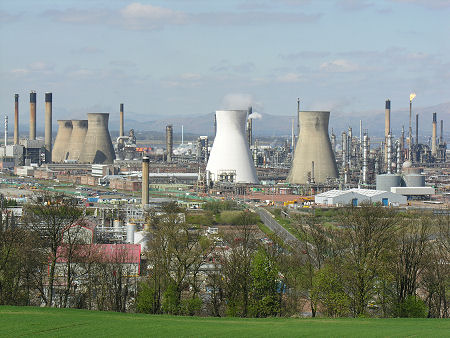 Grangemouth: Originally Developed by Sir Lawrence Dundas |
Sir Lawrence Dundas lived from 1712 to 21 September 1781. He was a politician and businessman known amongst other things for the development of Grangemouth. The wider picture in Scotland at the time is set out in our Historical Timeline.
Lawrence Dundas was the son of Thomas Dundas of Fingask, an Edinburgh merchant. He attended Edinburgh High School before setting up in business and built his fortune by speculating in shares and supplying the British army, under the Duke of Cumberland, during the Jacobite uprising of 1745/6. He was later an important supplier to the British army in Flanders during the Seven Years War from 1756 to 1763. He was made a Baronet in 1762.
Over the years Dundas built up substantial landholdings in Scotland and in Yorkshire, and acquired property in London. In 1752 he purchased land on the south bank of the River Forth. When the Forth and Clyde Canal was being planned in the 1760s he was able to persuade the canal company that its eastern terminus should on his land, where the Grange Burn flowed into the River Carron, close to where the latter in turn flowed into the River Forth. The original plan had been for the canal to emerge on the Forth at the already established port of Bo'ness, a few miles further east. For his part, Dundas agreed to build a new port at the eastern terminus of the canal, to allow trans-shipment of goods between sea-going and canal-going vessels. What quickly emerged was the Old Town of Grangemouth, clustered around the terminus of the canal.
During the development of Edinburgh's New Town, Dundas, having seen the plans proposed by James Craig, purchased land on the east side of what would become St Andrews Square for his Edinburgh home, Dundas House. Craig had intended this to be the site of a church, and Dundas's intervention disrupted the symmetry of the New Town. It is said that shortly after Dundas House was finished, Dundas lost it in a game of cards to General Sir John Scott, and that he had to pay for a new house to be built for Scott nearby so he could retain his family home. Today Dundas House is the headquarters of a bank.
James Boswell described Sir Lawrence Dundas as "a cunning shrewd man of the world". He found an outlet or his cunning in politics, serving as MP for Lanark Burghs from 1747-1748, and then as MP for Edinburgh from 1768 to 1781 after sitting as MP for a Staffordshire constituency earlier in the 1760s. In 1750 Sir Lawrence became a member of the Society of Dilettanti, a group promoting Italian culture in Britain. Sir Lawrence died in 1780 and was buried in the Dundas Mausoleum at Falkirk Old Parish Church.
